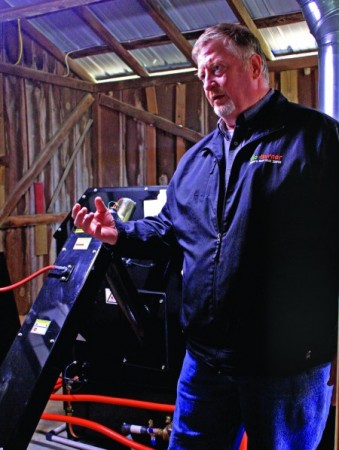
The Hutson School of Agriculture is making great strides to limit its dependence on petroleum diesel and other fossil fuels through research into renewable, natural, alternative fuel sources, but due to cost and availability the school is limited to what it can actually do.
Most recently, the school purchased a “bio-burner” in an attempt to lessen the utility costs at one of its facilities.
A Soybean Promotion Day in 2005 inspired faculty and staff at the school of agriculture to start using biodiesels on the farms to power their vehicles and machines. The Kentucky Soybean Association aided the school in this transition.
Biodiesels are used on the farms, to power its vehicles and machines, and are used whenever the school can afford to; the cost and availability of the biodiesels being the main limiting factors in their use at Murray State.
The last time the farms were able to use biodiesel was approximately six months ago.
Soybean-based biodiesel is produced through a refinery process called trans-esterification. This process consists of mixing methanol with sodium hydroxide, and mixing that product with the soybean oil. This blend can then be combined in different percentages with petroleum diesel to create biodiesel.
Tony Brannon, dean of the Hutson School of Agriculture, said biodiesels are also more environmentally-friendly than petroleum diesel, having far lower carbon dioxide emissions and degrading four times faster. Plus, using them limits our dependence on foreign oil.
Soy-based biodiesel performs almost identically to conventional diesel fuel in the areas of consumption, horsepower and torque.
Brannon said contrary to what most people believe, there are no negative ramifications to using biodiesel.
“Biodiesels support our industry, it is a natural resource and we can grow soy beans every year so it’s renewable,” Brannon said. “The fact is, one day, we’re going to run out of oil and we’re going to need these alternatives.”
The farms currently don’t have the certificates necessary to manufacture their own biodiesels and instead, are supplied with biodiesel by Mid-West Terminal – one of only four soy-based biodiesel distributors in Kentucky – via the Murray State Motor Pool.
Owensboro Grain furnishes these four distributors with their soy-based biodiesel, and is the only producers of soy-based biodiesel in Kentucky.
Brannon said there are units out in the agriculture industry, and areas available with which the farms could produce and commit to manufacturing their own soy-based biodiesels, although he said, it would be on a very small scale if they did one day choose to do so. He said the reassigning of what type of fuel the farms will use, specifically transitioning to using only biodiesels, is not a top priority for the school of agriculture right now.
The dean’s attention and efforts in sustainability, renewability and environmental friendliness are currently focused on the use of energy crops: energy dense plants that, when burnt, release high amounts of harness-able power.
The “bio-burner,” the machine responsible for converting biomass into energy, was installed at the Garrett Center on the Hutson farm, to test the effectiveness of burning energy crops. If this trial run is successful, Brannon said they will move on to acquiring more burners to power other buildings, starting first with the Equine Instructional Facility located on the West farm.
The Equine Instructional Facility, used for equitation classes and equestrian team practices, hasn’t had heat in its riding arena since it was built in 1998. The arena would require two bio-burners.
The farms plan on fueling the bio-burners with energy crops such as switch grass, sorghum, “energy sorghum” and “energy beets,” that will be grown on the farms.
Brannon said they also plan on burning the manure from the horses of which about 100 tons is produced annually.
Even excluding these current projects, Brannon said the Hutson School of Agriculture has always been at the forefront and a promoter of renewability and sustainability programs on campus, teaming with Food Services for years on a sustainability composting/recycling and gardening project and practicing other energy smart methods on the farms, like conservation tillage.
These practices advocate one of President Randy Dunn’s three commissions for Murray State, campus sustainability.
This commission entails the promotion of sustainability issues, the proposing of policies and programs, and the nourishing of campus organizations.
“This farm is not only a benefit to our university but also to our region,” Brannon said. “We have over 2,000 trials annually on our farms that benefit the agriculture sector of our region. We do a variety of tests, cattle research studies, dark tobacco research, soybean trials and many other types of research projects.”
Brannon said the school of agriculture is on the cusp of something big. He said if technology advances as much in the next 20 years as it did in the last 20, then he can see the farm becoming completely self-sustaining.
Written by Ben Manhanke, Staff writer.